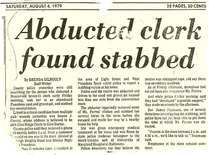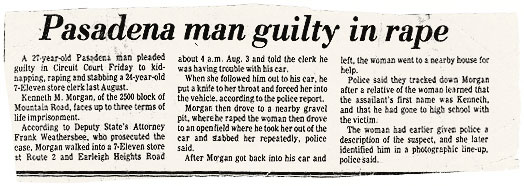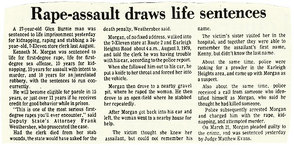A Sampling of the Articles Written About Donna's Attack
Blog About It
|
Victims of Crime vs Media
A victim has the right at all times to be treated with dignity and respect by the media. Victims' rights to privacy can be better protected by the active participation of a victim advocate. A victim advocate can play an effective role as a "go-between" for the reporter and the victim establishing an environment decided by the victim to speak to the press. This minimizes the invasion of privacy felt by the victim, allows advocates to advise victims about their rights in the media, and gives the media access to the story. Additionally, such a process assists those victims who wish to refuse to grant an interview. It also provides an opportunity for the advocate to assist the victim in preparing a statement, including reviewing the facts that can and cannot be released to the public, calming their fears, and being present when the actual interview is conducted .
Victims Have the Right:
A victim has the right at all times to be treated with dignity and respect by the media. Victims' rights to privacy can be better protected by the active participation of a victim advocate. A victim advocate can play an effective role as a "go-between" for the reporter and the victim establishing an environment decided by the victim to speak to the press. This minimizes the invasion of privacy felt by the victim, allows advocates to advise victims about their rights in the media, and gives the media access to the story. Additionally, such a process assists those victims who wish to refuse to grant an interview. It also provides an opportunity for the advocate to assist the victim in preparing a statement, including reviewing the facts that can and cannot be released to the public, calming their fears, and being present when the actual interview is conducted .
Victims Have the Right:
- To say "no" to an interview;
- To select a spokesperson or advocate of the victim's choice;
- To select the time and location for media interviews;
- To request a specific reporter;
- To refuse an interview with a specific reporter even though he or she has granted interviews to other reporters;
- To say "no" to an interview even though the victim has previously granted interviews;
- To release a written statement through a spokesperson in lieu of an interview;
- To refrain from answering any questions that are uncomfortable for the victim;
- To avoid a press conference atmosphere and speak to only one reporter at a time;
- To demand a correction when inaccurate information is reported;
- To ask that offensive photographs or visuals be omitted from airing or publication;
- To conduct a television interview using a silhouette or a newspaper interview without having their picture taken;
- To refrain from answering reporter's questions during a trial;
- To file a formal complaint against a reporter;
- To grieve in private.
|
I would suggest not giving any interviews with the media until after the trial is concluded .If you are a witness in your case, any media interviews are public knowledge and may be used against you by a defense attorney upon cross examination and could possibly cause a mistrial. I would air on the side of caution because even though you feel the interview might have gone well, they will slant it in the direction that will attract their readers.
Most of you know it takes years to finally get your case to trial. Potential jurors should be given all the facts once they are seated in the case. This will eliminate any pre-conceived notions they might have read or heard prior to hearing the facts in the case. |
Now Available for your Kindle or E-Reader!!
|






